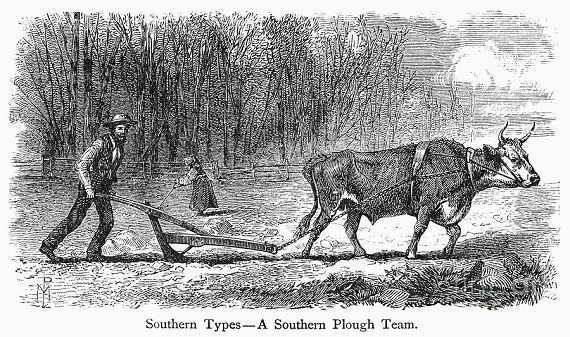If you were to conjure up an image in your head of an exploitive, money-grubbing industrialist with no regards for pollution or conservation, and I’ll bet a Yankee pops into your head. Conjure up another image of an unrealistic, environmentally addicted hippie, and I’ll bet a different Yankee pops into your head. So if the Yankees have a monopoly on the environmental extremes in our collective consciousness, is it safe to assume that Southerners are somewhere in the middle? Yes, more or less. When it comes to Nature, I think we get it.
I don’t want to suggest that Southerners have perfect policies on the great outdoors, but I do have a practical feeling that we understand Nature a little better than the Yankees, and I think part of it goes back to our historical relationship with the Indians. The four major Native American tribes in my home state of Alabama were Creek, Cherokee, Choctaw, and Chickasaw, and all four tribes fought either in whole or in part with the Confederacy. While the U.S. Government made a career out of exterminating the Indians, we Southerners have always gone the extra mile to get along and co-exist. I think there has always been a real and mutual respect between Indians and Southerners, and as a result, a lot of their ways are second nature to us. I have no doubt that government officials throughout the United States (including the South) treated the Indians with terrible and unforgiveable contempt, but my common sense tells me that individual Southerners and individual Indians managed to live with each other respectfully and prosperously. As James Rutledge Roesch noted in his magnificent blog about Ole Miss, some conquering armies throughout history have a disgraceful reputation for erasing and eradicating the culture of their vanquished, while others are noted for their respect of the cultures of their conquered subjects. That much is clearly evident by the ancient tribal names that still cover the map of my home. My hometown is Tuskegee, which is right next to Notasulga, Loachapoka, Wetumpka, Tallassee, and Opelika, and bordered between the Chattahoochee and Tallapoosa Rivers, with tributaries of the Saugahatchee and Choctafaula Creeks flowing nearby. Southerners worked and hunted the same land as their Indian neighbors, and learned as much as they could about Native American practicality towards the environment.
This entire train of thought came about because of a recent event in my personal life involving plastic bags. I have a friend who lives in California, and, bless her heart, she really means well. She thinks of herself as a full-blown environmentalist, and she begs me to sign petitions at least once a week. She gives away a percentage of her annual income to the World Wildlife Fund and she travels to Africa once a year to photograph gorillas and elephants. From her point of view, being “environmental” has much more to do with telling other people how to live rather than actually doing it herself. She calls it “raising awareness,” and it’s one of my favorite things to tease her about. Once, she sent me a photograph of a mother and baby rhinoceros and begged me to get involved with their preservation. Okay, so let’s assume this photo got me all jacked up about protecting the rhinos. Then what? What’s my next step? What am I supposed to do? There are no rhinos out at my farm, so there’s not a single thing I can do to protect a single one of them. Obviously, I think they’re magnificent beasts, and I would love to see one in person. But seriously, what am I supposed to do? I don’t know anyone who hunts rhinos, and I wouldn’t even know where rhinos are found without looking it up. As much as I’d like to help, there’s absolutely nothing I can do. There’s not a single phone call I can make, or visit I can take that’s going to save one single rhino. Shouldn’t she spend her energy “raising the awareness” of some Kenyan poachers instead of me? “Raising my awareness” isn’t going to accomplish anything except make her feel better about herself without having to actually get off the couch to do anything difficult. As much as I’d love to help exert some consumer influence on the Black Market, there aren’t any products I can boycott that uses rhino flesh, blood, urine, or bones. I just don’t think I’m the problem here (or anyone else I know, for that matter). But what I can do is something that she will never be able to accomplish no matter how hard she tries – practice what I preach.
As much as she whoops and hollers about something called the “carbon footprint,” she still manages to spend a lot of time every year flying to Canada, Africa, Europe, and Asia. On the other hand, I have taken a grand total of one single trip on an airplane in the past 20 years. To me, her approach has a lot in common with that old Vietnam War tactic of “destroying a village to save it.” She also raises hell constantly about buying organic foods, but here’s the problem. Dairy cows that aren’t loaded down with growth hormones produce less milk, therefore it takes MORE cows to produce the same amount of milk. More cows take up more room and produce a lot more methane, and there goes that whole carbon footprint argument. The exact same thing is true for organic produce. Since crops grown with no pesticides and organic fertilizers have lower yields, then it takes a lot more crops to produce the same harvest. More crops also take up more room and require more fossil-fueled refrigerator trucks to deliver them to market. On the other hand, I grow as much of my own food as I can manage, and I absolutely grow everything conventionally – which includes good old fertilizer and pesticides. I guarantee that I’m leaving a significantly smaller dent in the environment than she, and I think that is the essence of Indian environmental thinking. She also made the mistake once of telling me that I was “wasting paper and murdering trees.” I told her that I wasn’t murdering trees any worse than she was murdering cotton plants in order to wear blue jeans. Paper comes from pine trees, and where I live, pine trees are a crop. They are planted in rows and harvested, just like cotton. It’s not like people are chopping down the rain forests in order to make paper, so I’m not all that concerned about the carnage that’s taking place among our pine trees. Trust me, they grow back.
Well, anyway, her latest outrage is over the little plastic t-shirt-shaped bags from grocery stores and Wal-Mart. She’s very excited that they have been banned in California, and when I asked her what was wrong with the little bags, she told me that they don’t break down, and they’re not biodegradable. Respectfully, I disagree. Four years ago, I created a scarecrow contraption for my wife’s vegetable garden that consisted of dozens of those little plastic bags tied at intervals to a rope that ran around the perimeter of her garden two feet off the ground like a fence. The dangling, twisting, and turning of those bags in the wind would chase away the crows, theoretically. And it worked – for about two months. After spending two months in the hot, Alabama summer sun (with several thunderstorms thrown in for good measure), every single one of those bags crumbled into dust. Don’t tell me they don’t break down. Instead of reading and writing petitions, I did the same thing I envision the Indians would have done – tried it for myself. My results don’t correspond too well with those who have environmental agendas to push, but they are of great value to anybody who wants some practical environmental experience.
I celebrate Nature because I need her – not the other way around. Nature doesn’t “need” me to lift a single finger to save her. She’s more than capable of taking care of herself. I love Nature. I worship Her, and I am in awe of Her. I respect Nature and my fellow creatures on this planet. I care for Nature because it’s the right thing to do. It’s the right way to live. It’s the respectful way to be. In all practicality, there’s no way you can live on the planet without leaving some kind of impact. However, you can take small steps to see that your impact is as little as possible, and self-sustaining at every opportunity. I’m not talking about goofy stuff, like refusing to patronize stores that sell meat or fur. You can have the common sense to realize that death and destruction is as much a part of Nature as birth, life, growth, and prosperity. They go together amazingly well. The Indians completely understood that, and that’s good enough for me.







